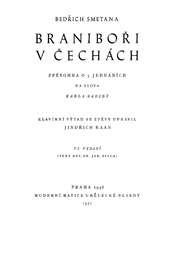The Brandenburgers in Bohemia
| The Brandenburgers in Bohemia | |
|---|---|
| Opera by Bedřich Smetana | |
 Sheet music | |
| Native title | Braniboři v Čechách |
| Librettist | Karel Sabina |
| Language | Czech |
| Premiere |
5 January 1866 Provisional Theatre, Prague |
The Brandenburgers in Bohemia (Czech: Braniboři v Čechách) is a three-act opera, the first by Bedřich Smetana. The Czech libretto was written by Karel Sabina, and is based on events from Czech history. The work was composed in the years 1862–1863. Smetana and Sabina wrote the opera at a time of great Czech patriotism, with the pending opening of a new theatre for production of Czech operas in Prague.
The opera received its first performance at the Provisional Theater (or the "Interim Theatre"[1]), Prague, on 5 January 1866, and the first performance was a success.[2] The first UK performances were in April 1978 by Hammersmith Municipal Opera.[3]
Roles
| Role | Voice type | Premiere Cast, 5 January 1866 (Conductor: Bedřich Smetana ) |
|---|---|---|
| Volfram Olbramovič, Lord Mayor of Prague | bass | František Hynek |
| Oldřich Rokycanský, a knight | baritone | Petr Doubravský |
| Junoš, young resident of Prague | tenor | Jindřich Polák |
| Jan Tausendmark, young resident of Prague | baritone | Josef Lev |
| Varneman, captain of the Brandenburgers | tenor | Jan Ludvík Lukes |
| Jíra, a runaway serf | tenor | Arnošt Grand |
| Ludiše, Volfram's daughter | soprano | Isabella Ferenczyová |
| Vlčenka, Volfram's daughter | soprano | Josefína-Marie Schmidtová-Procházková |
| Děčana, Volfram's daughter | contralto | Marie Pisařovicová |
| Old villager | bass | Josef Paleček |
| Town crier | baritone | Josef Čapek |
| Knights and soldiers, Olbramovič's men, villagers, Brandenburger soldiers, vagabonds and beggars, Judges | ||
Synopsis
- Place: Prague
- Time: the 13th century, during the occupation of Bohemia by forces of the Margraviate of Brandenburg.
Upon the death of King Ottokar II in the 1278 Battle on the Marchfeld, his widow Kunigunda had called in the Brandenburgian troops to lend aid against the army of victorious Rudolph of Habsburg. Rudolph retired to Austria, nevertheless the Brandenburgers soon acted like occupants: they arrested Kunigunda and her seven-year-old son Wenceslaus at Bezděz Castle and agreed with Rudolph that they would retain the Bohemian rule for the next five years.
The Prague people led by mayor Volfram Olbramovič suffer from the Brandenburg occupation. The citizen Junoš reports on plundering and lootering Brandenburgian troops. Ludiše, the mayor's daughter, rejects the approaches made by the German townsman Jan Tausendmark, who thereupon joins the occupants. The serf Jíra is designated the leader of a rebel movement. He openly charges Tausendmark with the kidnapping of the three daughters of the mayor, Ludiše, Vlčenka and Děčana. To avoid clashes of arms, Olbramovič has Jíra arrested. The mayor's daughters are kept by Brandenburg troops and Olbramovič asks Tausendmark to arrange for their liberation. However, the Brandenburg captain Varnemann demands a high ransom. Meanwhile Jíra is put on trial and condemned to death. However, it is Junoš, in love with Ludiše, who manages to save Jíra. Tausendmark, who intends to abduct Ludiše, fails to reach an agreement with Varnemann. He and the Brandenburgers are driven out of Prague, and the city is liberated.
Recordings
- 1963, Jan Hus Tichý (conductor), Chorus and Orchestra of the Prague National Theatre; Karel Kalaš, Jiří Joran, Ivo Žídek, Zdeněk Otava, Antonín Votava, Bohumil Vich, Milada Šubrtová, Miroslava Fidlerová, Věra Soukupová, Eduard Haken, Jindřich Jindrák
References
- Notes
- ↑ W. W. Cobbett, "Czech National Opera". The Musical Times, 45(732), pp. 92-95 (February 1, 1904).
- ↑ Brian Large, "Smetana's The Secret". The Musical Times, 113(1551), pp. 452-454 (May 1972).
- ↑ Brian Large, "Smetana's Brandenburgers". The Musical Times, 119(1622), pp. 329-330 (April 1978).
- Sources
- Amadeus Almanac, accessed 11 February 2010
- Warrack, John and West, Ewan, The Oxford Dictionary of Opera New York: OUP, 1992 ISBN 0-19-869164-5
External links
- Braniboi v echách, zpvohra o tech jedáních, slova napsal Karel Sabina; hudbu sloil Bedich Smetana; klavírní výtah s textem, upravil Jindich Kaàn z Albest (piano reduction with text): Open Library, accessed 30 August 2014